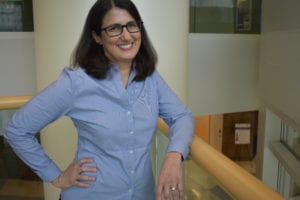Posted by: Anna Miller, PhD student, Case Western Reserve University
We sat down with ASHG Board Member Dana Crawford, Associate Professor of Population and Quantitative Health and Genetics and Genomics Sciences at Case Western Reserve University, to learn more about her work and what motivates her.
ASHG: Tell us about your position.
Dr. Crawford: I am an Associate Professor at Case Western Reserve University (CWRU) with a primary appointment in Population and Quantitative Health Sciences and a secondary appointment in Genetics and Genome Sciences. I am also Assistant Director of Population and Diversity Research in the Cleveland Institute for Computational Biology. I am formally trained in human genetics and genomics, and my current research interests intersect with genetic epidemiology and precision medicine, all with an emphasis on diverse populations. As expected for an academic position at a research university, most of my effort is devoted to basic and translational research. My remaining effort is devoted to service and teaching. Towards the latter, I currently direct a graduate-level course on science communication here at CWRU.
ASHG: You are involved in many societies — ABRCMS, ASHG, etc. What are the professional and personal rewards of scientific society involvement?
Dr. Crawford: Yes, I am a member of several professional societies. Currently, I am most actively involved with the American Society of Human Genetics (ASHG) where I am a member of the board and chair of the Diversity and Inclusion Task Force. I also serve as a DNA Day judge, and I have co-chaired sessions and reviewed abstracts. As a trainee and now investigator, I of course submit my own abstracts and session proposals hoping for that coveted oral presentation slot!
In addition to ASHG, I am also actively involved with the Annual Biomedical Research Conference for Minority Students (ABRCMS) and the Society for the Advancement of Chicanos/Hispanics and Native Americans in Science (SACNAS). At ABRCMS, I am Ambassador for Computational and Systems Biology, an abstract reviewer, and a poster judge. For SACNAS, I review abstracts and submit session proposals on average every-other-year for the last few years.
For me, professional service provides many rewards. The elected board position at ASHG is a professional reward important for the tenure and promotion process in academics. On a personal level, it has been fascinating to be involved with a large society undergoing a strategic planning process that will set the course for the society for the next few years.
All three aforementioned societies have also provided me professional and personal avenues to promote and directly impact diversity in biomedical research. ABRCMS and SACNAS are heavily attended by undergraduate students interested in graduate or medical school. While I am heartened to see so many students interested in science as a career, I am shocked at how few are considering human genetics and genomics. Case in point: Computational and Systems Biology is the smallest of all 12 disciplines represented at ABRCMS.
We have a great opportunity to introduce underrepresented students in science to our exciting and rapidly evolving field, and I am very happy to play my part in this effort.
ASHG: What are you currently reading/thinking about?
I have been doing both professional and personal reading related to promoting inclusivity and diversity in biomedical research. Why are there so few scientists in genetics and genomics from underrepresented groups? Why do women, despite being overrepresented in graduate school for many sub-disciplines, remain woefully underrepresented in senior-level positions in academia? My readings loosely related to these topics range from the peer-reviewed literature (e.g., PMID:31633016, PMID:31642926. PMID:31270782, and PMID:25593183) to non-fiction best sellers (She Said, Know My Name). While not all readings are strictly about science, all touch on historical and present-day social issues (e.g., #metoo, racism) that have directly and indirectly impacted the composition of today’s biomedical workforce.
Anna Miller is a PhD student in Genetics and Genome Sciences at CWRU, and has been an ASHG member since 2019.

